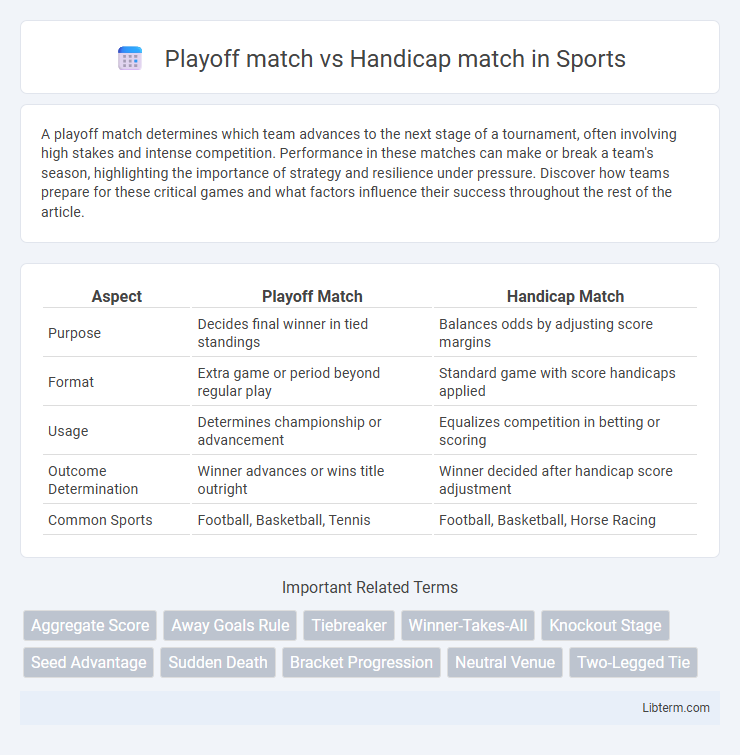A playoff match determines which team advances to the next stage of a tournament, often involving high stakes and intense competition. Performance in these matches can make or break a team's season, highlighting the importance of strategy and resilience under pressure. Discover how teams prepare for these critical games and what factors influence their success throughout the rest of the article.
Table of Comparison
| Aspect | Playoff Match | Handicap Match |
|---|---|---|
| Purpose | Decides final winner in tied standings | Balances odds by adjusting score margins |
| Format | Extra game or period beyond regular play | Standard game with score handicaps applied |
| Usage | Determines championship or advancement | Equalizes competition in betting or scoring |
| Outcome Determination | Winner advances or wins title outright | Winner decided after handicap score adjustment |
| Common Sports | Football, Basketball, Tennis | Football, Basketball, Horse Racing |
Understanding Playoff Matches: Definition and Format
Playoff matches determine the winner in competitions tied after regular play, often featuring extra time or sudden death formats to ensure a definitive result. These matches are distinct from handicap matches, where one participant receives a scoring advantage to level the playing field. Understanding playoff matches involves recognizing their high-stakes nature and formats designed specifically to break ties and declare an outright winner.
What Is a Handicap Match? Key Features Explained
A handicap match in sports betting levels the playing field by assigning a virtual advantage or disadvantage to teams or players, making the odds more balanced and competitive. Key features include adjusted scorelines or goals that affect the final outcome for betting purposes, ensuring wagers remain fair even when skill levels differ significantly. This type of match is popular in football and other sports where uneven matchups might otherwise discourage betting interest.
Key Differences Between Playoff and Handicap Matches
Playoff matches are decisive contests used to determine a winner in the event of a tie, emphasizing direct competition under equal conditions, while handicap matches involve giving one player or team a scoring advantage or disadvantage to balance skill disparities. In playoff matches, the outcome is straightforward and based solely on performance, whereas handicap matches adjust scoring to make the competition more equitable and unpredictable. This fundamental difference impacts strategy, as playoff matches demand peak performance under pressure, and handicap matches require overcoming or leveraging the scoring adjustments for victory.
Scoring Systems: Playoff vs Handicap Matches
Playoff matches determine a winner through extra holes or sudden-death scenarios when players are tied, emphasizing hole-by-hole performance and pressure scoring. Handicap matches adjust each player's score by subtracting their handicap strokes, leveling the playing field and making net scores the key to victory. Scoring in playoff matches is strictly gross and focused on immediate results, whereas handicap matches prioritize net scores to reflect skill differences.
Strategic Approaches: Playoff vs Handicap Play
Playoff matches require teams to adopt high-intensity, clutch performance strategies due to the all-or-nothing nature of the competition, emphasizing adaptability and psychological resilience. Handicap matches demand a focus on calculated risk-taking and leverage of assigned advantages, driving tactical planning to maximize the handicap's benefit while minimizing vulnerabilities. Strategic approaches in playoffs revolve around short-term peak performance, whereas handicap play strategies center on long-term resource management and incremental gains.
Popular Sports Utilizing Playoff Matches
Playoff matches are commonly used in popular sports like basketball, American football, and hockey to determine champions through a knockout or series format, enhancing competitiveness and fan engagement. These matches often follow a regular season, contrasting with handicap matches prevalent in sports like soccer and tennis, where one competitor is given a points or goal advantage to level the playing field. The playoff structure emphasizes performance under pressure, making leagues like the NBA, NFL, and NHL highly popular due to their thrilling postseason contests.
Sports and Events That Use Handicap Matches
Handicap matches are widely used in sports like golf, tennis, and snooker to level the playing field by giving advantage points based on players' abilities, while playoff matches are common in team sports such as basketball, football, and hockey to determine a winner after regular game times end in a tie. Handicap systems are particularly prevalent in individual sports and betting scenarios to create balanced competition and enhance spectator engagement. Playoff matches emphasize high-stakes elimination rounds that culminate in championship decisions, contrasting with the adjusted scoring approach in handicap matches.
Pros and Cons: Playoff Matches Compared to Handicap Matches
Playoff matches offer a clear and decisive conclusion by requiring competitors to perform under pressure in a winner-takes-all scenario, which increases viewer excitement and stakes. Handicap matches level the playing field by assigning advantages or disadvantages based on skill levels, promoting fairness and competitive balance but potentially reducing the unpredictability or excitement for some audiences. While playoff matches enhance drama and clarity in outcomes, handicap matches encourage inclusivity and equal opportunity, making the choice dependent on the desired dynamics and fairness emphasis in the competition.
Impact on Player Psychology: Playoff vs Handicap Formats
Playoff matches intensify player focus and resilience by creating high-stakes, all-or-nothing scenarios that amplify pressure and drive competitive determination. Handicap matches introduce psychological complexity by leveling skill disparities, which can boost confidence for underdogs while challenging favorites to maintain composure and adapt strategies. Both formats uniquely influence player mindset, affecting motivation, stress management, and performance outcomes in critical competition phases.
Choosing the Right Match Type for Competitions
Choosing the right match type for competitions depends on the desired level of competitiveness and fairness; playoff matches often determine the ultimate winner through direct elimination, creating high stakes for all participants. Handicap matches balance skill disparities by giving advantages to weaker competitors, promoting inclusivity and more evenly matched contests. Understanding the goals of the tournament--whether to crown a definitive champion or to encourage balanced competition--guides organizers in selecting between playoff and handicap formats.
Playoff match Infographic

 libterm.com
libterm.com